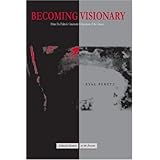
Average Reviews:

(More customer reviews)Though increasing in number (largely thanks to the work of Stanley Cavell, one of the key influences on this new book), legitimately philosophical accounts of film can be hard to come by, and many of those which are available offer either reductive flavors of 'philosophy' or tout the depth of particular films while giving short shrift to the philosophical issues they supposedly address. Against this backdrop, Eyal Peretz, who received a PhD in Comparative Literature from Yale and who is currently teaching at the University of Indiana, has set out for himself the ambitious task of studying a set of films (those of Brian De Palma) while simultaneously remaining soberly philosophical and rigorously attentive to the spirit of the films themselves. This is no simple task, yet Eyal Peretz's 'Becoming Visionary' is, in a single word, a triumph.
'Becoming Visionary' showcases in-depth readings of four particular De Palma films - the horror classic 'Carrie', the Antonioni-homage/thriller 'Blow-Out', the Kirk Douglas sci-fi family drama 'The Fury', and the recent neo-noir 'Femme Fatale' - and relates each of these to specific philosophical and theoretical concerns, including the notion of contingency, the sensation of horror, the relation of visual perception to meaning, and the role of paranoia and visions of false causality in creating narrative. Each of these readings is focused and nuanced, and all give considerable support to Peretz's designation of De Palma as an auteur uniquely sensitive to the uncanny dimensions of his medium. Whereas some might initially dismiss De Palma's work as B-grade or somehow undeserving of thoughtful attention, for Peretz, De Palma's films offer virgin ground for critical inquiry, and enter into philosophical dialogue on equal footing with blue-chip directors like Hitchchock. It is to Peretz's credit that, after reading 'Becoming Visionary', one can only agree with him.
Yet much more is it stake in 'Becoming Visionary' than a reading of a specific set of films, or even an elevation of De Palma's work to a new plane of artistic legitimacy. Peretz instead sets out to create a novel and systematic engagement with the philosophical relevance of cinema itself. Neither philosophy nor film studies suffers in this project: moments like Peretz's synopsis, early on, of the Platonic problematic of ideality versus representation are as lucid and insightful as his survey and critique of different Film Studies accounts of the suture and the frame. At both of these points in particular, a handful of Peretz's pages provides an incredibly sophisticated, clear, and fair take on topics that present several book-length 'introductions' (which you'll find separately shelved under 'Film' and 'Philosophy') a serious one-up in terms of impact, clarity, and analysis. This knack for consistent clarity and precision coexists in 'Becoming Visionary' with an earnest refusal to sidestep complex issues, or to tone down challenging points in Peretz's own analysis. Peretz's willingness to problematize and render more complex the models he suggests - by regularly engaging the idea of a division within the seeing eye, of competing conceptions of the frame, and so forth - is truly impressive, and contributes to construction of a remarkably comprehensive account of film, one that stands solidly alongside the conceptual edifices of Deleuze or Cavell, and which retains a pedagogical forcefulness all its own.
Hopefully, the discussion around 'Becoming Visionary' is just beginning. Peretz's book contains many things - a much-needed scholarly appraisal of a filmmaker often neglected by academics, thoughtful rejoinders and additions to several heated questions in modern film criticism, and a set of elegant reflections that draw in equal parts on Plato, Deleuze, Lacan, and Cavell. But 'Becoming Visionary' is one thing above all others: it is a sustained and effective object lesson in a revolutionary way of 'reading' films philosophically. Indeed, unlike many philosophically inclined writers, who take cinema as simple fodder for analyses in which films instantiate philosophically weighted scenarios and provide merely anecdotal supplements to illustrate philosophical arguments, Peretz proposes and performs a difficult praxis that instead allows films to stage their own, unique way of philosophizing. Benefitting from Peretz's restrained and sensitive guidance, 'Becoming Visionary' shows how films can pose deeply philosophical questions through strategies and devices that, for all their 'filmic' artifice, throw open radically new perspectives on how meaning is constructed, on how we engage our senses - and not just the visual -, and on how we as subjects process representation, narrative, and experience itself. 'Becoming Visionary' is thus a welcome addition to Stanford's Cultural Memory in the Present series, and is a work that students, teachers, and those interested in disciplines from Literature to Cultural Studies to Media & Film alike would do well to read and heed.
Click Here to see more reviews about: Becoming Visionary: Brian De Palma's Cinematic Education of the Senses (Cultural Memory in the Present)
How is one to think the significance of the art of film for philosophy? What would it mean to introduce film as a question into the heart of the philosophical enterprise? How would this transform our understanding of film, on the one hand, and of philosophy and the philosophical tradition, on the other? These are the questions that guide this project on the hitherto critically neglected but seminal film director Brian De Palma. Becoming Visionary: Brian De Palma's Cinematic Education of the Senses is located at the intersection of philosophy and film studies, and makes each of these disciplines productive and useful for each other in a new way. It is a concrete examination of the logic governing the work of a major American artist that is, at the same time, a general philosophical examination of the logic of meaning governing all the major filmic categories and is thus a comprehensive theory of film. Becoming Visionary develops a new matrix for thinking the relations between philosophy and film and, by extension, between philosophy and the arts

0 comments:
Post a Comment